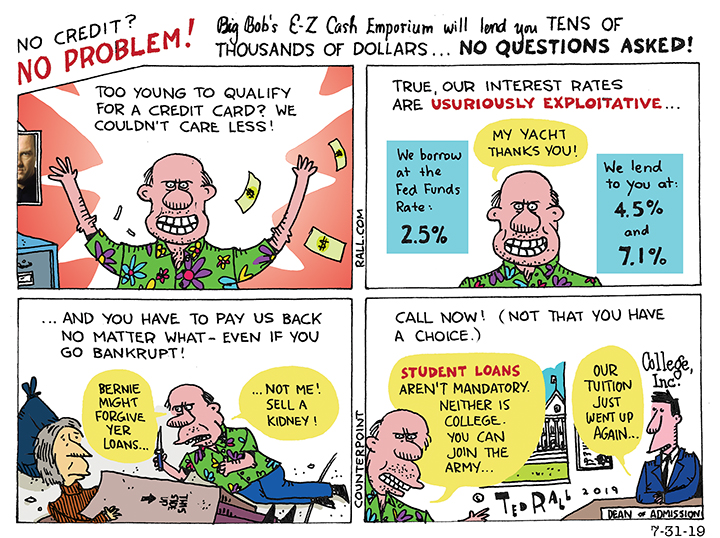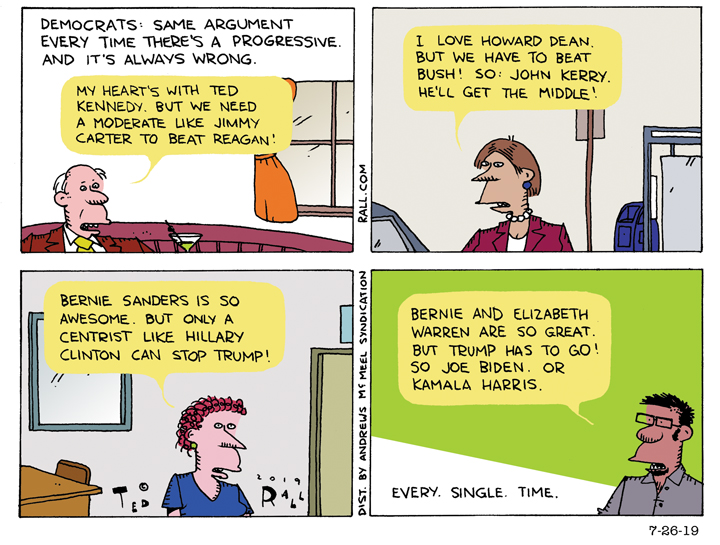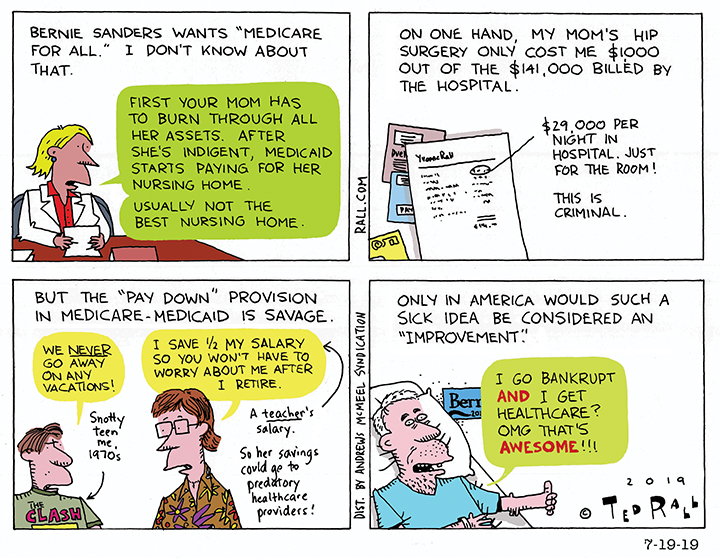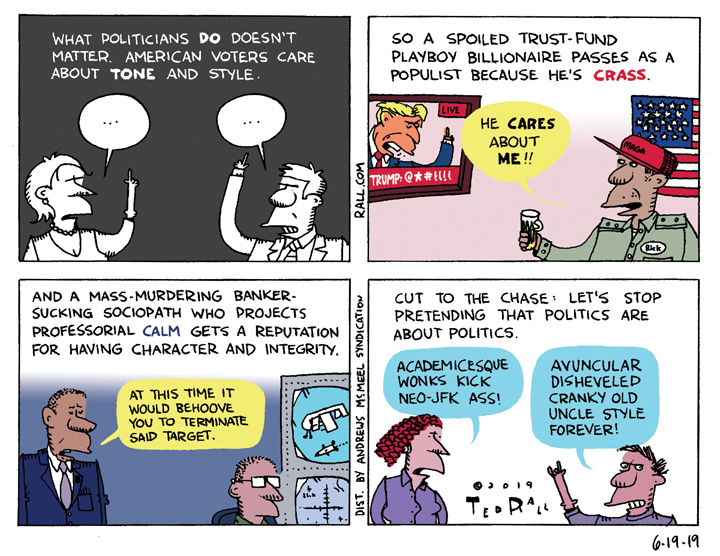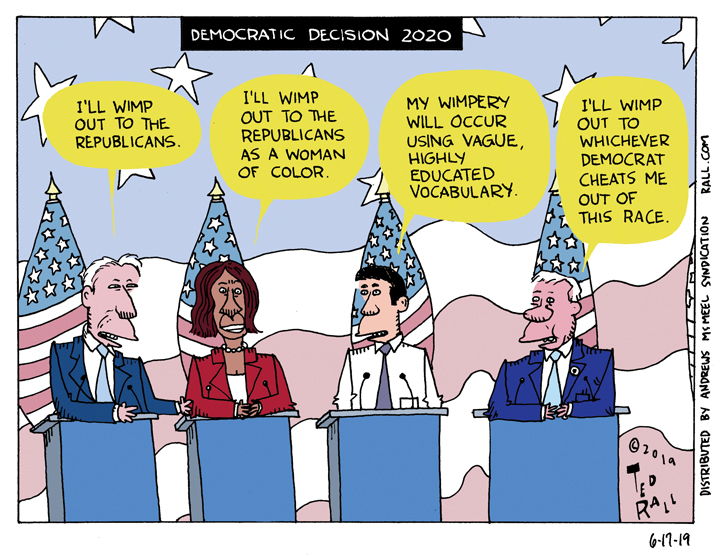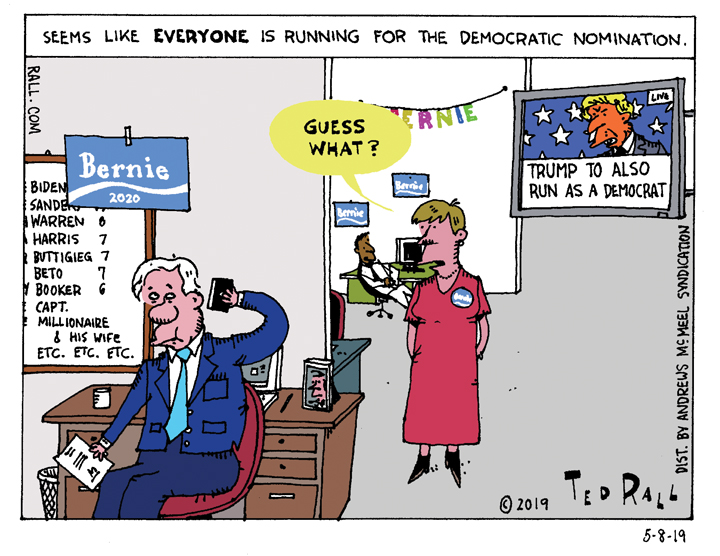To hear banks and their defenders tell it, student loan recipients have a moral obligation to return full payment plus exorbitant interest rates to their lenders. But what about the responsibility of lenders not to overcharge or to issue loans to people too young to understand their implications?
Bernie’s Plan to Address the Retirement Crisis: It’s Good That It Exists. But It’s Not Nearly Enough to Solve the Problem
 Two weeks ago Bernie Sanders announced his “right to a secure retirement” plan. The media didn’t notice, the voters didn’t care, no one’s talking about it. But the problem is huge and about to get huger. And the government isn’t doing jack. As I wrote a year ago in a column that no one gave a crap about: “Born in 1961, the oldest Xers are graying, aching, 57. And in trouble. A New School study projects that 40% of workers ages 50-60 and their spouses who are not poor or near poor will fall into poverty or near poverty after they retire…The rapidity and scale of downward mobility among the elderly will shock American society, precipitating political upheavals as dramatic as those we saw during the 1930s.” Make that 58.
Two weeks ago Bernie Sanders announced his “right to a secure retirement” plan. The media didn’t notice, the voters didn’t care, no one’s talking about it. But the problem is huge and about to get huger. And the government isn’t doing jack. As I wrote a year ago in a column that no one gave a crap about: “Born in 1961, the oldest Xers are graying, aching, 57. And in trouble. A New School study projects that 40% of workers ages 50-60 and their spouses who are not poor or near poor will fall into poverty or near poverty after they retire…The rapidity and scale of downward mobility among the elderly will shock American society, precipitating political upheavals as dramatic as those we saw during the 1930s.” Make that 58.
For the first time, the elderly now account for one out of five suicides. Experts expect that number to rise.
Like Sanders, Elizabeth Warren wants to shore up the finances of the Social Security system by imposing Social Security taxes on all income brackets, not just the lower ones, and replacing the current cost of living calculus with a metric that more realistically captures seniors’ spending habits. But only Sanders has proposed a plan to address the millions of Americans growing into old age with inadequate savings and pensions as healthcare costs soar.
So let’s take a look at Bernie’s plan.
“Beyond implementing Medicare for All and expanding it to include dental, hearing and vision coverage, Sanders’s health care plan will offer seniors supports and services at home ‘without waitlists, asset and income restrictions, and other barriers,’” reported The Hill. Heavier reliance on at-home care is one of the way more advanced countries like France care for older people. Well into her descent into Alzheimer’s my French grandmother continued to live at home; an attendant did her cooking, cleaning and laundry. She only moved to the hospital at the very end. (She tried get out of bed to go to the bathroom, fell, hit her head and died.)
Caring as I am now for my mom, who also has Alzheimer’s, I have to say that dental, hearing and vision costs—though significant—pale next to the $60,000-a-year-plus expense of nursing home care. Sanders’ plan would not address this pressing need.
Sanders wants to improve wages and working conditions for America’s beleaguered homecare workers. This is desperately needed—for the workers. For the aged and their caregivers, however, this means increased costs. Though happier homecare assistants will presumably do a better job, it’s odd that Sanders includes this idea as part of a retirement security agenda.
Sanders would expand “the 1965 Older Americans Act that would seek to create a new office within the Administration for Community Living to study social isolation among seniors and its impact and provide grants to states and municipalities to address the issue.” Sounds like another opportunity for state governments to fritter away poorly supervised federal funds on higher bureaucratic salaries and to plug holes in their budget when what is really needed is a direct transfer of cash into the bank accounts of older Americans and their families.
Sanders’ plan is full of Band-Aids like that. He would “expand the Low Income Home Energy Assistance Program to guarantee heating and cooling assistance, bolster the Commodity Supplemental Food Program to combat hunger among seniors and cap credit card interest rates at 15 percent and curtail the practices of loan sharks to protect seniors from ‘scams and predatory financial practices and instruments.'”
Make no mistake: when you can’t pay your heating oil bill and it’s February in Minnesota, you’re happy for any help you can get. Meals on Wheels is awesome. Credit card rates are too damn high. The creatures who record your “yes” when a robocaller calls you so they can run up unauthorized charges on your cards should be drawn and quartered.
But this is such lame legislation and in such small portions. Anyone who still believes Sanders is unrealistically ambitious need only look at this stuff.
If politics is the art of the possible, Americans should realize that what’s possible is much, much more than they’ve ever been told by either party or the press.
Under President Hugo Chávez gas cost 7 cents a gallon in Venezuela. Chávez’s logic was unimpeachable: Venezuela was the hemisphere’s largest producer of fossil fuel. Why shouldn’t Venezuelans benefit from their own country’s natural resources?
The United States has quietly become the largest energy producer on earth. Not just the elderly—everyone in the U.S.—should be paying next to nothing for fuel. (Spare me the emails about the environment. We need to ditch fossil fuels yesterday but, until we do, this is about economic justice.)
No one—again, not just senior citizens—should go hungry in this, the richest nation on the planet. It’s simply a matter of reallocating resources from the super wealthy and lawbreaking corporations to individual people who need them more.
The average bank savings account pays 0.1%. Bernie’s 15% cap on credit card rates doesn’t go nearly far enough. How about 1%? Banks would still make a profit.
My takeaway: Bernie Sanders deserves credit for trying to turn the looming retirement crisis into a 2020 campaign issue. It’s long overdue. His plan is detailed, plausible and stands head and shoulders above his rivals merely for existing.
But it’s weak tea. Even if it were enacted in its entirety it would still leave millions of Americans in coming years homeless and living in abject poverty. It doesn’t address the primary problem: paying for nursing home care that currently runs over $7,700 per month.
I wish progressives like Sanders would take a cue from President Trump in political negotiations: ask for the stars and you might wind up with the moon. Compromise with yourself in anticipation of your rivals’ complaints, ask for the upper atmosphere and you’ll likely get nothing much at all.
(Ted Rall (Twitter: @tedrall), the political cartoonist, columnist and graphic novelist, is the author of “Francis: The People’s Pope.” You can support Ted’s hard-hitting political cartoons and columns and see his work first by sponsoring his work on Patreon.)
Every Single Time, Centrists Say They’ll Win. And They Never Do.
It’s the oldest debate within the Democratic Party: what to do about a progressive insurgent candidate? Whether it’s Ted Kennedy’s challenge against Jimmy Carter in 1980, Howard Dean against John Kerry in 2004 or Bernie Sanders against Hillary Clinton, moderates and centrists always say the same thing: in order to win, you need those swing voters. That means you have to pick the moderate choice. The problem with that argument is that it never really works out in the general election. Kennedy and Dean’s voters stayed home in November. 3 to 4,000,000 Bernie Sanders primary voters never showed up for Hillary Clinton. Now the same argument is being floated again, this time in favor of Joe Biden.
In Defense of Purity Tests

Supporters of center-right Democrats like Cory Booker and Kamala Harris have a response to left progressives who criticize their candidates for cozying up to Wall Street banks and trying to execute innocent men: stop with the purity tests!
The term is everywhere these days. “In the political world,” Alan MacLeod writes for FAIR, “the term ‘purity test’ has a very specific meaning, largely used by elites to chastise and attack the left, or to gaslight them into supporting more centrist or right-wing policies.”
Progressives should not fall for the purity-test smear. Voters have every right to demand certain standards of behavior and policy positions in exchange for their support. And so far, lefties have not asked for much: $15-an-hour minimum wage, Medicare For All, free college tuition, eschew donations by corporations. Yet even these modest attempts to nudge the needle to the left go too far for the Third Way/Democratic Leadership Council/moderates clinging to control over the Democratic Party.
Barack Obama is leading the charge. The former president and self-described “moderate Republican” recently argued that Democrats “sometimes creat[e] what’s called a ‘circular firing squad’ where you start shooting at your allies because one of them is straying from purity on the issues.” The word “allies” is interesting. Is someone who disagrees with you on important issues really an ally?
Here’s a typical use of the term from the June 6th edition of that most elitist of establishmentarian power-sucking publications, the New York Times: “In a contest where purity tests on the left have already propelled leading campaigns to disavow super PACs and reject money from federal lobbyists, is [accepting] tech money still politically acceptable?” The corrupting influence of super PACs is well-documented yet the Times wants us to think a politician can take their cash without being bought.
Framing is everything in politics and the “purity test” trope is one of the cleverest reframes in recent history. Describing the world as complicated—well, duh—the purity test narrative portrays politicians who fall short of the progressive Puritans’ impossibly high standards as victims of a shrieking mob. Virtuous attackers become fanatic Javerts, persecutors of minutiae. Corrupt, bloodthirsty scoundrels deserve our sympathy—and our votes.
Screw that.
Everyone—left, right, center—assesses candidates based on their personal metrics. Some are demographic: Is Mayor Pete too young? Is Bernie too old? Some are relatively arbitrary: Is Amy Klobuchar too mean of a boss? Is Beto too spazzy?
What right-wing Democrats call “purity tests” are what used to be called “standards.” They’re about ideology. And they’re valid.
Eighteen years into the losing war against Afghanistan, left-leaning Americans have good cause to question militarism and its enablers. Joe Biden voted for the Iraq War. He’s never even apologized. Bernie Sanders voted no when it was unpopular to oppose Bush. Why shouldn’t progressives conclude that Sanders is closer to them—not to mention smarter? Biden voted to kill more than a million Iraqis for no reason whatsoever; being held accountable for contributing to one of the biggest mass murders in history no more constitutes a purity test than voting against Charles Manson for mayor.
The Democratic tent has long included officials who oppose abortion. Now that states are passing bans against abortion that don’t even include exceptions for incest and danger to the life of the mother, however, Democratic presidential candidates like Harris and Julián Castro say that all Democrats should be pro-choice. Given how strident the pro-life movement has become and the fact that Roe v. Wade is likely to be overturned, it’s hard to dismiss this as an inane “purity test.”
Don’t be fooled, progressives. You have the right to vote for, or against, any candidate you want, for any reason you want. Personally, I can’t support anyone who doesn’t oppose drones, Gitmo, torture, militarism, wars of choice and doesn’t support huge cuts in defense spending. I can’t support someone who doesn’t think saving the planet from ecocide is our top priority. I can’t support a person who doesn’t want to tax the hell out of the rich and eradicate poverty.
Center-rightists tell me that my standards are too high, that none of the current field of 24 presidential candidates can pass my test. They’re probably right. But it’s not my problem. It’s theirs.
(Ted Rall (Twitter: @tedrall), the political cartoonist, columnist and graphic novelist, is the author of “Francis: The People’s Pope.” You can support Ted’s hard-hitting political cartoons and columns and see his work first by sponsoring his work on Patreon.)
Campaign 2020: Why Joe Biden is the Least Electable Democrat
![]()
As one of the few pundits who correctly called the 2016 election for Donald Trump, it would be wise to rest on my laurels rather than risk another prediction, one that might turn out wrong.
But how would that be fun? Let the 2020 political prognostications begin!
The arithmetic of the 2016 Republican presidential primaries is repeating itself on the Democratic side in 2020: a big field of candidates, one of whom commands a plurality by virtue of name recognition—which implies higher “electability”—while his 20-or-so opponents divvy up the rest of the single-digit electoral scraps.
The Trump 2016 dynamic will probably play out the same way when Democratic delegates are counted at the 2020 convention. But the outcome in November 2020 is likely to be the opposite: Trump gets reelected.
Here’s how I see it playing out.
In 2016 there were 17 “major” (corporate media-approved) GOP presidential candidates. Famous and flamboyant, Donald Trump consistently polled around 30% throughout the primaries. That left his 16 relatively obscure rivals to fight over the remaining 70%. Considering that 70% divided by 16 comes to 4.4%, his runner-ups Ben Carson (14%), Ted Cruz (9%) and Marco Rubio (9%) outperformed the field. Yet Trump’s lead was too big. They couldn’t catch him.
Twenty-four Democrats are running in 2020. Here again, we have one really famous guy—it’s hard to get more famous than former vice president of the United States—plus the rest. In this contest, the odds of an upset are even longer. Joe Biden polls at around 38%, significantly better than Trump did. The remaining pie slice is smaller than Carson, Cruz, Rubio, etc. and gets chopped up into even more pieces.
Next comes Bernie Sanders—the early frontrunner, now number two—at about 18%, with Kamala Harris, Elizabeth Warren and Pete Buttigieg each getting about 8%. (62% divided by 23 equals 2.7%.) Although Sanders is suffering from his failure to follow my advice to move left, it’s also easy to see why progressives suspect another DNC conspiracy to screw him.
“Having many candidates is a standard Democratic Party tactic to draw down support for any insurgent candidate,” writes Rodolfo Cortes Barragan, a candidate for Congress from south L.A. “When it was just Bernie vs. Hillary, all the anti-Hillary Democratic voters had to go somewhere, and they all went to Bernie. But now Bernie’s votes will be split with progressive icons like Warren and Gabbard, as well as with progressive-sounding corporate politicians like Buttigieg, Harris, and Biden.”
Here I will insert my standard disclaimer that the elections are an eternity away, that things can and will change, you never know what will happen, blah blah blah.
But as things stand at this writing, Biden will probably take the nomination unless he dies or there’s a new scandal.
After the summer 2020 conventions, the 2016 scenario diverges from 2020.
I tend to discount “blue no matter who” and “anyone but Trump” chatter from centrist Democrats who argue that this president is such a threat to everything good and decent about the world that everyone must set their personal preferences aside in order to vote the bastard out. Besides, many of the people who urge unity have no credibility. They voted for Hillary but if Bernie had been the nominee they would not have turned out for him. Progressives weren’t born yesterday. Tired of 40 years of marginalization, they turned a deaf ear to the Clintonites’ self-serving unity pleas, boycotted the general election and denied Hillary her “inevitable” win.
And here’s the thing: they don’t feel bad about it.
If anything the schism in the Democratic Party between the progressive majority (72%) and corporatist centrist voters has widened and hardened over the past three years. Both sides are intransigent: Hillary’s voters accuse Bernie’s boycotters of handing the White House to Trump; Bernie’s supporters point to polls that consistently showed he, not Clinton, could have beat Trump.
Progressives are still angry that the Democratic establishment cheated Bernie Sanders out of the nomination last time. News that they’re doing the same thing now has enraged them.
That includes progressives who plan to vote for one of the other progressives or progressives-come-lately. By any measure, Joe Biden is not progressive. He’s number one in the polls but far behind the aggregate total of his progressive opponents. (I omit zero-policy candidates like Beto O’Rourke and Pete Buttigieg and centrists like Amy Klobuchar from my back-of-the-envelope calculations even though their support includes some progressives.) The party is ramming Biden the corporatist down the throats of Democratic primary voters using classic divide-and-conquer.
It will work. The Democrats will emerge from this nomination fight even more divided than the last cycle. Like the Mad Queen at the conclusion of “Game of Thrones,” Biden will inherit the ruins of a party he destroyed.
Trump goes into 2020 stronger than ever. Republicans are unified. Democrats look like fools for the debunked Russiagate fiasco and like wimps for refusing to try to impeach him. The economy looks strong. If the president lays off Iran, we’ll be relatively at peace. In the Rust Belt swing states it’s not just Republicans who like his trade wars. Abortion will not motivate as many voters as liberals hope.
At the same time, Joe Biden is the worst candidate in the Democratic field, even worse than Hillary Clinton. Some progressives voted for her because of her history-making potential as first woman president and her role trying to make healthcare policy. Biden offers nothing like that for progressive voters. He’s a warmonger who voted to kill a million people in Iraq. He’s against Medicare for all. He undermined Anita Hill, pretended to apologize years after the fact, and then took it back. And he’s just another old white man. No one is excited about him.
Only one thing can defeat Donald Trump: a unified, enthusiastic, progressive front. Biden’s rivals should pick one of their own, drop out and pledge to campaign for him or her. OK, two things: Biden should quit for the good of his party. Of course neither of these will happen.
I currently predict that Trump will win bigly.
(Ted Rall (Twitter: @tedrall), the political cartoonist, columnist and graphic novelist, is the author of “Francis: The People’s Pope.” You can support Ted’s hard-hitting political cartoons and columns and see his work first by sponsoring his work on Patreon.)
The Secret Campaign for 2020: Where the Democratic Candidates Stand on Foreign Policy

Americans vote their pocketbooks. It’s the economy, stupid. Absent a war or recent terrorist attack, conventional wisdom believes that voters prioritize domestic issues. Right now, conventional wisdom is correct. According to the latest Pew Research poll, the five most important issues for Democrats are healthcare, education, Medicare, poverty and the environment.
So it’s not surprising that the major Democratic presidential contenders’ campaigns are focusing on economic and other America-centric issues. Nor is it shocking that the news media, never more anemic or less willing to question the candidates, is ignoring their stances on foreign policy. You could watch 5 hours and read 50 pages of news every day and never learn where a top Dem stands on issues of war and peace, defense spending, assassination drones, Guantánamo, NSA surveillance of Americans, foreign adventurism or human rights. Trust me, I know.
Still, voters deserve to know the would-be presidents’ positions on issues that extend beyond U.S. borders. Here’s what I found.
The Democrats on Our Crazy Defense Spending
The military sucks up 54% of discretionary federal spending. Pentagon bloat has a huge effect on domestic priorities; the nearly $1 trillion a year that goes to exploiting, oppressing, torturing, maiming and murdering foreigners could go to building schools, college scholarships, curing diseases, poetry slams, whatever. Anything, even tax cuts for the rich, would be better than bombs. But as then GOP presidential candidate Mike Huckabee said in 2015, “The military is not a social experiment. The purpose of the military is to kill people and break things.” If you’re like me, you want as little killing and breaking as possible.
Unfortunately, no major Democratic presidential candidate favors substantial cuts to Pentagon appropriations.
Current frontrunner Joe Biden (33% in the polls) doesn’t talk much about defense spending. He reminds us that his son served in Iraq (so he cares about the military) and that we shouldn’t prioritize defense over domestic programs. Vague. Though specific programs might get trimmed, Lockheed Martin could rest easy under a President Biden.
“Since he arrived in Congress, [runner-up] Bernie Sanders [19%] has been a fierce crusader against Pentagon spending, calling for defense cuts that few Democrats have been willing to support,” The Hill reported in 2016. “As late as 2002, he supported a 50 percent cut for the Pentagon.” Bernie is still a Pentagon critic but he won’t commit to a specific amount to cut. He wouldn’t slash and Bern. He’d trim.
Elizabeth Warren (8%) wants “to identify which programs actually benefit American security in the 21st century, and which programs merely line the pockets of defense contractors — then pull out a sharp knife and make some cuts.”
Neither Pete Buttigieg (8%) nor Beto O’Rourke (6%) have articulated any firm foreign policy positions whatsoever. Buttigieg brags about having served in the Navy Reserve. Unlikely that either man would change much.
Kamala Harris (5%) has not weighed in on military spending. She has received substantial campaign contributions from the defense industry, though.
The Democrats on Wars for Fun
As senator, Biden voted for the optional wars against Afghanistan and Iraq. He lied about his votes so maybe he felt bad about them. He similarly seems to regret his role in destroying Libya.
Sanders voted to invade Afghanistan. His comment at the time reads as hopelessly naïve about the bloodthirsty Bush-Cheney regime: “The use of force is one tool that we have at our disposal to fight against the horror of terrorism and mass murder… it is something that must be used wisely…and with great discretion.” Sanders voted against invading Iraq, favored regime change in Libya (albeit nonviolently) and voted to bomb Syria.
There have been no major new wars since 2013, when Warren joined the Senate so her antiwar bona fides have not been tested. Like many of her colleagues, she wants an end to the “forever war” against Afghanistan. She also wants us out of Syria.
Harris too is new to the Senate (2017). Statements on various conflicts indicate that she is a foreign policy hawk in the Hillary Clinton mold. Harris favors the U.S. bombing campaign against Syria, blank-check approval for Israel and sabre-rattling against North Korea. She buys into the discredited Russiagate narrative.
Warren is the only high-level antiwar candidate but she could be BSing.
Democrats on Drones
The assassination drone program begun by Bush and expanded upon by presidents Obama and Trump have killed thousands of innocent people in Africa, the Middle East and South Asia, almost all innocent. Drone strikes have demolished America’s moral standing. “Just about everywhere else in the world, opposition to drone strikes is sweeping,” The Washington Post reported in 2014. Anti-American terrorists often cite drone strikes as justification for attacking the U.S. It’s only a matter of time before other countries, and non-state actors like Hezbollah and ISIS, use them against us.
Though generally skeptical of large ground invasions like Iraq, Biden is a fan of drone assassinations. Sanders acknowledged in a 2015 interview with me that drones make killing “too easy” but nevertheless said he would continue terror-by-air as president. Warren doesn’t talk about drones. Neither does Harris.
None of the major Democratic candidates would cancel the drone program.
Democrats on Gitmo
Opened shortly after 9/11, the U.S. concentration camp at Guantánamo is a nasty blotch on America’s human rights record that terrorists use to justify killing Americans and put the lie to every pronouncement the government issues about human rights abuses in other countries. Torture, rape and even murder are routine at this notorious facility.
In 2005 Biden said the U.S. “needs to move toward shutting down” Gitmo. In 2016 he said he “hoped” it would close down. He has not called for an immediate shutdown.
Kamala Harris always refuses to comment—a stance that speaks volumes.
Bernie Sanders and Elizabeth Warren are the only two who have consistently argued that Gitmo should be closed. “We look like hypocrites and fools to the entire world,” Sanders said in 2016.
Democrats on NSA Spying Against Americans
The mass surveillance programs revealed by Edward Snowden continue to scoop up every email, text message, phone call and every other form of communication you can think of within and into the United States. Whether the NSA and other agencies will be allowed to continue will determine whether we can avoid an Orwellian dystopia.
Joe Biden, though to the right on other foreign-policy issues, was a critic of NSA spying for years, going back at least to 2006. Under Obama, however, he backtracked. Even worse, Biden called the president of Ecuador in 2013 to request that he deny asylum to NSA whistleblower Edward Snowden.
Bernie Sanders alone would end warrantless mass surveillance and said Snowden “did this country a great service.” Warren doesn’t discuss it much except to say it would be nice to have “an informed discussion.” Harris favors some limits but generally keeps quiet.
Except for Biden, the Democratic presidential field is dominated by progressives and progressives-come-lately—on domestic issues. When it comes to foreign policy, there isn’t as much difference as progressive voters would like between the Democratic and Republican parties.
(Ted Rall, the cartoonist, columnist and graphic novelist, is the author of “Francis: The People’s Pope.” You can support Ted’s hard-hitting political cartoons and columns and see his work first by sponsoring his work on Patreon.)

